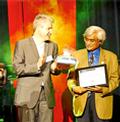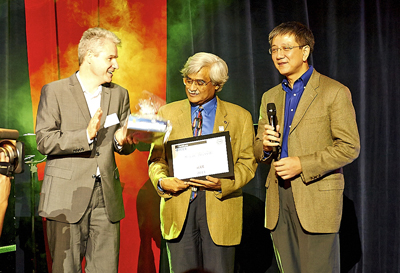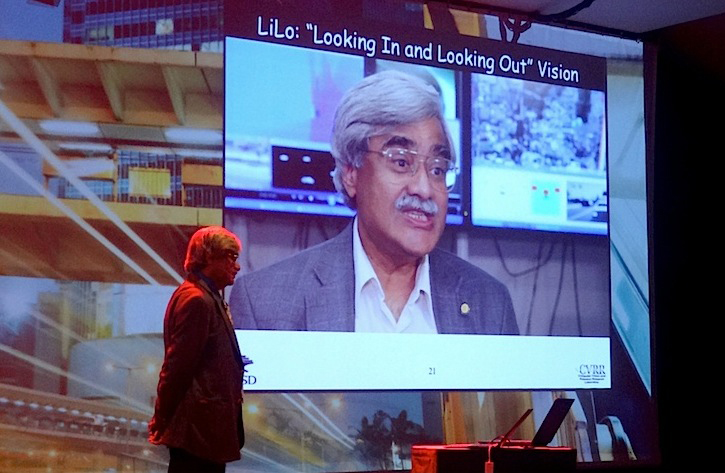博文
祝贺"老朋友"的成就
||||
认识MT十余年,2005年Las Vegas 的IEEE IV的Keynote Speech使他进入ITSS,
后又邀他做T-ITS的AE,十年的交往可成一本书。
祝贺Mohan 获IEEE ITS Outstanding Research Award!
Dear Fei-Yue, Please accept my sincere thanks for your friendship and support..mohan
 11/5/13 Pioneer in Smart Car Revolution Honored by IEEE Society
11/5/13 Pioneer in Smart Car Revolution Honored by IEEE SocietyFull Story
San Diego, Calif., Nov. 5, 2013 -- University of California, San Diego electrical and computer engineering professor Mohan Trivedi is the recipient of the 2013 Outstanding Research Award from the IEEE Intelligent Transportation Systems (ITS) Society. The award is given annually to recognize outstanding contributions to research in intelligent transportation as well as contributions to the ITS community.
|
Professor Trivedi was cited for his “contributions to machine vision and learning for intelligent vehicles, and driver assistance and transportation systems.” He was honored with the award at the 16th International IEEE Conference on Intelligent Transport Systems in the Dutch capital, The Hague.
The director of UC San Diego’s Laboratory for Intelligent and Safe Automobiles (LISA) received his award from the current President of the ITS Society, Christoph Stiller (pictured, at left), a professor from Germany’s Karlsruhe Institute of Technology.
According to UC Riverside professor Matthew Barth, who will take over as President of the ITS Society in January, Trivedi has been a pioneering contributor to the ITS Society. “Not only has he helped guide it through a rapid growth stage, but he has served as an unofficial mentor to many of the younger members of the society, including myself,” said Barth. “He is very friendly, collaborative, and always looking for ways of bringing different people together to promote new research. In addition, his computer-vision research applied to the transportation arena has been very valuable in terms of improving safety, mobility, and the environment. He is a great collaborator and friend.”
“Professor Trivedi is the author or co-author of numerous papers on traffic systems and vehicle control, including in particular, applications of machine vision,” said Berthold K.P. Horn, a leading researcher at MIT. “He has done much to push the field ahead both in his home institution and worldwide. His Laboratory for Intelligent and Safe Automobiles is well known and widely respected – and I just assigned one of his recent papers as required reading to students involved in one of our own projects.” Horn is also a member of MIT’s Computer Science and Artificial Intelligence Laboratory (CSAIL).
|
In addition to accepting the award at the official dinner, Trivedi gave a formal presentation the following morning. In it, he observed that cars are getting smarter, but he does not expect autonomous vehicles to take over roadways anytime soon. He raised a question that he called “the elephant in the room”: What happens if drivers do not want to hand over the driver’s seat to fully autonomous systems?
Added Trivedi: “Do we really think they want to hand over all the responsibility to a robot?”
While the idea of autonomous vehicles continues to capture the imagination of the news media, Trivedi has focused instead on what he calls a driver-centered, holistic approach to tomorrow’s intelligent vehicles. [Click here for on-demand viewing of his presentation in The Hague, courtesy Brendan Morris.]
“Understanding human behavior is very important for humans, and I would suggest that this is part of the intelligence that has evolved in us to give us better understanding of each other and various situations,” said Trivedi. “Understanding human behavior may be essential for robotic systems too. So we may want to think about these two systems not as ones that will fight with each other, but as a distributed, cognitive, intelligent system, where they share what they perceive and control in a very harmonious manner.”
For more than a decade, researchers in Trivedi’s lab have developed technologies that capture and integrate visual and other information about the driver, the vehicle, and the area surrounding the vehicle.
“What impresses me is his focus on making road traffic safer through what he calls an holistic approach to systems, combining development of models for the driver, vehicle, and the vehicle’s surroundings as well as the various activities associated with the complex task of safe driving,” said UC Berkeley Professor Pravin Varaiya, winner of the 2009 IEEE Intelligent Transportation Systems Society Outstanding Research Award. “This research has led to an accumulation of new insights and algorithms for capturing the dynamic environment of the vehicle and the state, intent and activity patterns of drivers.”
Ever since 2001, when Trivedi’s team deployed a crude model from Mercedes with a system of then-bulky cameras to test computer-vision algorithms, the researchers have undertaken research projects funded by wother auto manufacturers, including Nissan, Toyota, Volkswagen and Audi, as well as various federal and California funding programs. In a short period, carmakers have implemented computer vision systems that have already gone a long way toward what Trivedi calls LiLo – “looking in and looking out” vision.
LISA researchers have demonstrated the ability to predict that a driver will change lanes a full two seconds before the driver does so. Similarly predictive systems can tell in advance whether a driver plans to turn left or right. In his latest, three-year project with Audi – part of the Audi Intelligent Urban Assist program – Trivedi’s team developed systems to assist drivers in large metropolitan areas. [For background on the Audi project in San Diego, watch this video.] The UC San Diego engineers developed a way to tell the driver when it’s safe to merge into another lane. The car can also recommend the best speed at which to merge into the designated lane, based on the distances and speeds of cars in surrounding lanes. Another technology developed with Audi makes it possible for the car to brake automatically if the car’s computer detects that the driver is not alert to an impending danger.
|
Looking to the future, Trivedi told his fellow Intelligent Transportation Systems researchers that there is still a lot to learn from looking in and looking out of the vehicle. Current predictive cues are generally gathered from the face, but hand and foot movements also offer valuable cues. Meanwhile, Trivedi is convinced that people will remain in the driver’s seat for the foreseeable future, but with much more assistance from their cars’ cameras and computers.
“Prediction is very difficult but I really believe that several billion of us will not, one fine morning five years from now, decide that we don’t want to have anything to do with [driving] cars,” Trivedi told the audience in The Hague. “We really want to live in a world where both of us distribute our cognitive intelligent capabilities – and co-exist.”
Doug Ramsey
Jacobs School of Engineering
Phone: 858-822-5825
dramsey@ucsd.edu
IEEE Intelligent Transportation Systems Society »![]() 16th International IEEE Conference on Intelligent Transport Systems »
16th International IEEE Conference on Intelligent Transport Systems »![]() Video: Mohan Trivedi: Holistic Perception for Active Safety in Intelligent »
Video: Mohan Trivedi: Holistic Perception for Active Safety in Intelligent »![]() Video: IEEE ITS Society Outstanding Research Award »
Video: IEEE ITS Society Outstanding Research Award »![]() Laboratory for Intelligent and Safe Automobiles (LISA) »
Laboratory for Intelligent and Safe Automobiles (LISA) »![]() LISA Google Scholar Publications »
LISA Google Scholar Publications »![]() Jacobs School of Engineering »
Jacobs School of Engineering »![]() Electrical and Computer Engineering »
Electrical and Computer Engineering »![]() Qualcomm Institute of Calit2 »
Qualcomm Institute of Calit2 »![]()
Youtube1: ITSC 2013 获奖报告
Youtube2: 项目讲座
https://m.sciencenet.cn/blog-2374-744167.html
上一篇:天命唯新:迈向知识自动化
下一篇:祝贺2014年智能交通IEEE Fellow


